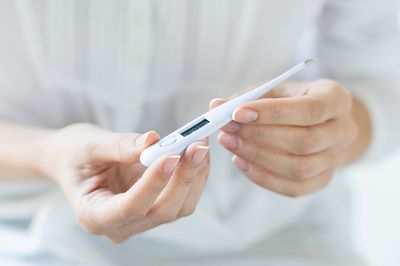
Women of child bearing age should be aware of early pregnancy symptoms in order to prepare for their pregnancy period. Pregnancy is a nine-month phase in every woman’s life during which she becomes a complete individual since she carries a new life within her. A lack of awareness about the symptoms can lead to late realizing that one is pregnant, and it is quite possible to miss the first steps of taking care of the growing baby.
The first trimester (the entire pregnancy period is divided into three trimesters) is crucial for the development of the child and it is very important to be careful from the beginning. As a mother-to-be, it is crucial to know the symptoms of pregnancy so that the expectant mother can take proper care of herself and her unborn baby. However, even though some symptoms are quite common and occur to every pregnant woman, they cannot be generalized.
What To Expect During Pregnancy
The first symptom of pregnancy is usually a missed period (amenorrhea). Nevertheless, if you miss your periods normally, then it isn’t a significant symptom. If you are underweight, or if you suffer from anxiety or stress, you could also miss your period. Be aware that you may have slight bleeding around the time of your period and you could still be pregnant. Breast enlargement is another sign that you could be pregnant. It is likely that there will be tenderness around the breasts, as well as prominent veins on the breasts. If you feel tired and dizzy the whole day, it is likely that you are pregnant.
The feeling of dizziness is very different during pregnancy, and you feel like sleeping all day long. If you are working, your friends could catch you taking short naps during the day. A nausea and vomiting, quite important early signs of pregnancy, can occur at any time during pregnancy. Bad smells, bad tastes, or other causes can cause it. Be prepared to carry a vomit bag at all times while pregnant. The taste of food changes considerably during pregnancy. Despite your dislike for certain foods in the past, you can enjoy them now.
Cramping Symptoms Of Pregnancy
After the fertilized egg gets implanted at the inner lining of the uterus, the size of the uterus starts to grow. An increase in the size of the uterus is considered to be the main cause of pregnancy cramping. Some medical professionals consider cramping an indication of a successful conception. An expecting mother’s body undergoes drastic changes as her body prepares to support a new life inside it. A very early pregnancy symptom is cramping along with slight vaginal bleeding that is commonly referred to as implantation bleeding or spotting, which is caused by the implantation of the fetus into the uterus. This vaginal spotting is light in comparison to normal menstruation periods. This spotting cannot persist for more than a couple of days. Implantation bleeding, unlike normal menstruation, is pink in color.
When Is Cramping Serious?
Apparently, the early pregnancy symptom – cramping – is nothing to be concerned about, rather it is a positive indicator of successful conception. Women who are expecting to become pregnant should be on the lookout for this symptom. The cramps felt during a regular menstruation are similar to the cramps experienced during pregnancy, so some women have difficulty detecting pregnancy based on this symptom. After conception, cramping is considered harmless and natural, but an increase in its severity may indicate pregnancy complications. Vaginal bleeding requires medical attention if: – you experience heavy bleeding – the bleeding is dark in color – the cramping pain continues even after taking rests for a few hours. When you notice something negative through your very early pregnancy symptom – cramping, immediately contact your gynecologist if you have a previous history of miscarriage. rly pregnancy symptom.
Generic symptoms include:
There are some general symptoms of pregnancy, which may or may not be indicative of an early pregnancy. Any of these symptoms, however, should prompt you to take a clinical or home pregnancy test. Pregnancy symptoms such as nausea and vomiting are common. Within a week of conception, this symptom appears. Tea, coffee, and other common foodstuffs can trigger nausea. Early pregnancy symptoms such as breast swelling or tenderness are very common. During the first few hours or days following conception, some women may find their breasts tender or swollen.
Cervical mucous may also increase after conception for some women. Cervical mucous is also whiter and thicker. Heartburn and indigestion have also been observed in pregnant women, along with constipation. Very soon after conception, mood swings or irritability may also appear. The sudden changes in hormone levels can make a newly pregnant woman short-tempered. Some of the above symptoms may also be caused by factors other than pregnancy. Nausea, for example, can be caused by indigestion or stomach infections, among other things. Some symptoms are rarely inaccurate in predicting conception.
Pregnancy and Your Body
The body of a pregnant woman undergoes many ch During pregnancy, a woman experiences many physical and psychological changes that cause dramatic changes in her body gnancy. The hormonal changes occur to support the development of the fetus inside. Pregnant women tend to experience some common symptoms in the early trimester. There are no differences between early pregnancy symptoms, but slight differences should be expected.
Let’s now look at the symptoms of pregnancy and how to identify them – Implantation Bleeding Implantation bleeding is also known as vaginal spotting. It occurs when the fertilized egg attaches to the uterine wall during early pregnancy. In following ways you will getBy observing implantation bleeding, you can differentiate it from normal vaginal bleeding – It appears approximately five days after fertilization. The color of this vaginal discharge appears to be light, unlike the


